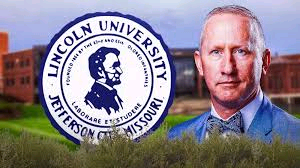…Family, Others Allege Bullying, Racism And Harassment
A historically Black college and university is mourning the death of one of its former administrators, and some alumni say racism was at play and the institution’s president is to blame.
Antoinette “Bonnie” Candia-Bailey was the vice president of student affairs at Lincoln University of Missouri, an HBCU in Jefferson City. Candia-Bailey, who was Black, died by suicide on Monday.
According to Sherman Bonds, the president of Lincoln’s National Alumni Association, she’d recently been fired.
Now, the university’s board of curators, its governing body, is conducting a review of its president, John B. Moseley.
Moseley, who’s white, “Has volunteered to be placed on paid, administrative leave while that review is conducted,” the board’s statement says.
The board plans to hire a “third-party expert” to do the probe.
“As a Board, we are committed to making certain the mental health of Lincoln University employees is a priority and that every employee is always treated with dignity and respect,” said Board of Curators President Victor Pasley in a statement.
“The Board has confidence in the leadership team we have at Lincoln, but as we all work together to serve students and the Lincoln University community, this review will fully examine important questions, concerns and gather facts.
Dr. Moseley agrees those issues should be examined and has volunteered to go on leave during the review so that it can move forward in a fully independent way.”
In her email sent in the early hours of Jan. 8, which included in its previous email threads, Candia-Bailey referenced her mental health struggles and accused Moseley of “intentionally” harassing and bullying her. Candia-Bailey, a Lincoln alumna who joined the university last May, described scenarios in which she was set up to fail as an administrator.
“You had no intention of retaining me as the (vice president of student affairs),” the email states.
“It went downhill after the FMLA and ADA documents were submitted due to my severe depression and anxiety. I requested to be removed under your leadership and from (the president’s advisory council) as this was causing significant attacks. This is all documented and emails sent.”
The email says she received a 36 out of 100 on a November 2023 professional evaluation despite regularly working after-hours and not receiving examples of why her marks were so low.
“Lincoln is where it started for me and where it ended,” she wrote.
Candia-Bailey’s aunt, LaDonna Candia-Flanagan, confirmed in an email to USA TODAY Friday that the cause of death was suicide.
“Dr. Bonnie, as she was affectionately called, was known for her vibrant personality, quick wit, and infectious smile,” Candia-Flanagan said in a statement, citing the alleged bullying and harassment.
“She left an indelible mark on everyone she encountered. Born with an extroverted spirit, she never met a stranger and was admired for her kind and compassionate nature. Dr. Bonnie’s confidence, unique style, and her ability to challenge the thoughts of others set her apart as a true leader.”
The university and Moseley did not immediately respond to USA TODAY’s requests for comment on Friday.
What is an HBCU?Everything you need to know about historically Black colleges or universities
In a Facebook post-Thursday, the university offered a brief tribute to Candia-Bailey and offered its condolences to her family.
“She was a gifted colleague and always a passionate advocate for Lincoln University, HBCUs and other causes in which she believed,” the post said.
The Lincoln and broader HBCU communities are reverberating with testimonials about the positive impact Candia-Bailey had, with many highlighting the racial dynamics at play. Social media posts with the hashtags #firemoseley and #justiceforbonnie question why a white man oversees a Black college and describe the mistreatment Candia-Bailey allegedly endured as a Black woman.
In a letter posted to the Lincoln Alumni Association’s Facebook page on Thursday, Frances E. Curtis, an alumnus and fellow sorority member who was cc’d on Candia-Bailey’s Jan. 8 email, lamented Moseley’s leadership and “re-branding” of the institution.
Mosely is Lincoln’s first white president since 1922.
Curtis wrote that Moseley “CAN NOT speak for me. He does NOT speak for me.”
“How can this man work in the best interest of young people who are Black like me when he does not reflect them racially or culturally,” Curtis posed in the letter, directed to the university’s board of curators.
Federal data shows that 44% of the university’s students identify as Black and 40% identify as white.
“I believe that the dynamics of race played a huge part in this,” Wilmore, one of the alumni who forwarded Candia-Bailey’s email, said in an interview with USA TODAY.
“Many of us honestly in our hearts believe there was some specific bias and targeting from Moseley to Dr. Bonnie.”
Chazz Robinson, an education policy adviser at the think tank Third Way, met Candia-Bailey several years ago as a doctoral student still finding his way in the world of academia.
Having grown up in a working-class family, raised by a single Black mom, he lacked the connections and money many of his peers enjoyed and frequently questioned his worth.
But Candia-Bailey, then an administrator at a small college in Massachusetts, encouraged him to participate in a panel comprised of scholars more experienced than him and ensured he got paid for his time.
She praised him in front of others, highlighting his merits and potential.
“She had a smile that lit up the space. … She was just really special and someone I never forgot,” Robinson said.
Her death “should be a wake-up call: Black women are going through a lot, and we as a society have to do better by them. We have to do better by recognizing mental health, and by creating environments in the workplace where it doesn’t have to come to that.”
Bonds, the national alumni association president, agreed that Candia-Bailey’s death should prompt change, and said he’d been concerned about Moseley’s leadership since he was appointed in early 2022.
“The present administration has become a liability to the mission and health of the institution,” he wrote in a Jan. 9 letter.
Wilmore, a history professor and sports coach who now lives in South Carolina, highlighted the camaraderie of the Lincoln community, and how its alumni have consistently come together in moments of grief.
“It seems like every year we’re losing a family member,” Wilmore said. But through it all, “Lincoln has always stuck together, Lincoln has always been family-oriented. … And whenever the family is targeted and done wrong, we tend to back that family member up.”
Claudine Gay was just the start:US college presidents feel a chilling effect
USA
Today














